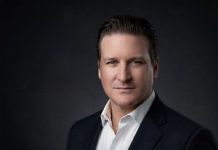Tom LeNoble Podcast Transcript
Tom LeNoble joins host Brian Thomas on The Digital Executive Podcast.
Brian Thomas: Welcome to Coruzant Technologies, home of the Digital Executive podcast.
Welcome to the Digital Executive. Today’s guest is Tom LeNoble. Tom LeNoble is an international speaker, resilience coach and executive leader who equips organizations and individuals to thrive through change. With a dynamic career spanning Fortune 500 companies, high growth startups, and mission driven ventures, Tom brings a rare blend of strategic insight in human-centered leadership to every stage boardroom and coaching engagement.
A former executive at companies like Facebook, Walmart, Palm, Verizon. Tom also played pivotal roles in successful startups including support space I print and speed date. Tom’s commitment to impact extends beyond the workplace. He’s deeply engaged in philanthropic efforts that support underserved communities, women, youth, and education.
His own journey through life-threatening illness and personal loss has made him a powerful advocate for resilience, presence, and purpose. His life and work are a testament to the mantra he lives by. I am still here.
Well, good afternoon, Tom. Welcome to the show.
Tom LeNoble: Hello, Brian. It’s great to be with you.
Brian Thomas: Absolutely, my friend. I appreciate it and really making the time. Normally, I know you’re on the west coast, but today you’re in Maui, out in Hawaii, and I’m here in Kansas City. Boring and hot here, so I just appreciate you making the time.
Tom, if I could, let’s jump into your first question. You’ve worked across Fortune five hundreds startups and mission driven ventures. What common thread do you see?
Tom LeNoble: When it comes to leadership in times of change, I think that one thing that’s common across all those forms, which I get the question, which do you like best?
The big one or the startup? And my answer is always yes, is it still involves people. It still involves some of the things that we have to do working with one another. The challenges are not that different. They may be on a different scale. So the common thing I see is. People and how people work together and how we come together to either build something or maintain something, or even create something new.
Brian Thomas: Thank you. I appreciate that, and you get at the end of the day, I think we talked a little bit about humans before we hit record, but absolutely right. Challenges are the same across the spectrum of companies size or not. The scale might be a little different or the projects or the resources as far as funding, but I certainly appreciate that.
Tom, tell us about the risk ability factor that’s trademarked. What inspired its creation and how can leaders apply it in uncertain or high stakes environments?
Tom LeNoble: Well, my business is primarily based on risk and resilience, and I created the risk ability factor because it’s a 20 question instrument you can do to find out just exactly how much risk you take and what it means to you, and that’s how it got formed was to give people a way to look at that.
I have a few things that I do in my business. The risk ability factor is one of them. I also have something called the haystack method where you hear people talking about it. It’s like finding a needle in a haystack. Well, to me it’s quite simple. You just remove the hay and I hold the space for people to see their own answers by helping them get the hay out of the way.
Brian Thomas: Wow. I like that analogy. Removing the hay, obviously a needle in the haystack, that is, that’s amazing. But I like that you created this risk ability factor, that 20 point evaluation or checklist, and that kind of takes some of the, as I call it, the hay or the BS out of it all, and you get right down to foundational leadership principles that you can help.
Big environments, especially those high stake environments, so I appreciate that. Tom, you’ve held leadership roles at companies like Facebook, Walmart, and Palm. What were some of the key lessons you took from these fast-paced, high impact environments?
Tom LeNoble: To go in with an open mind. To adapt to the environment.
As you can imagine, when I went to Facebook, I interviewed with Mark Zuckerberg when he was 19, and when I showed up for that interview, everyone that was there was young enough to be my child. And as I started working at Facebook, ’cause I ultimately went there after being really intrigued with the product and the willingness to share information, everyone that worked with me.
And on my team was fresh out of school, deferring law school, business school from the top universities, and I could have gone in and been very much about my corporate experience or the things I’d learned at startups, but instead I was willing to learn from them as we started building the customer operations of face.
Very similarly going into Walmart. I was fortunately at walmart.com, which was a very different environment than Walmart, but I spent about 70% of my time in Bentonville, Arkansas. Two worlds that could have collided, and once again, I realized we’re all people. And bridging that and being willing to learn and teach and share was what brought the success.
And at Palm, I was responsible for global service operations, traveling around the world and working in other countries. As we worked on our service offering and through the trio, if anyone of your viewers remembers that at that time, and even the challenge there of other cultures and how you respect them and look at them and have an open mind that your culture may not be the only or the best, and to respect what you see and what you’re working on.
So I bring it all back down to people respecting others’ ideas, being able to share yours, and an awareness of an open mind and being willing to learn.
Brian Thomas: That’s awesome. Thank you so much. Just love to hear people’s stories. Going into these environments with an open mind is what I heard, and I really particularly love the story about you interviewing with Mark Zuckerberg when he was starting out there.
Appreciate that. Learning from others, even younger generations. I took away a couple things is respect what you see, the cultures, the environment. Learning, teach, and share. At the end of it, people are the heart of everything that we do in this world. Tom, the last question of the day I have for you. You often speak on purpose-driven leadership.
In your view, how can today’s leaders reconnect with their purpose amidst relentless change and noise?
Tom LeNoble: I’ll give you a, a great example of somebody I’m working with and the CEO came to me and was sharing with me how he has done everything in his organization to build an open environment where people could talk to each other and then share with me that, but no one ever comes to see me in my office.
And the more we talked, the more I learned. I looked at him and I said, you know, this is very, very simple. Have you ever thought about getting out of your office? You’re the CEO, you have a title. It’s very intimidating to people. You’re creating an environment, but you’re not participating in it. So I think that I use that example to share with you how important is for us to remember in the fast driven pace today and all the things that are going on in our world that.
People still identify with people and being human and meeting people where they are is how you can build and grow and make people respect you and understand what your leadership is about. And then you add into that a little listening. The important part of listening is listening for what’s being said.
Not for what’s going on in your head about how you might respond. The person listening to you knows you’re not listening to them fully, and you’re missing out on some important information. So I think this idea of not only being visible and interacting, being human, but being willing to listen to others.
Brian Thomas: Awesome. Thank you. And I highlight a few things. I, I like the story about the CEO really trying to, you know, make it in an open environment, make it where it’s approachable. Maybe he left his door open, but until, as you said, get outta your office and start meeting with folks, people aren’t just gonna come to you.
You’ve gotta meet him. At least halfway. People still need people in that connection. And listening, of course, as you probably heard this throughout life, is God gave us two ears and one mouth, and I totally agree with the listening factor as you make human connections. So thank you so much, Tom. It was such a pleasure having you on today, and I look forward to speaking with you real soon.
Tom LeNoble: Thank you, Brian. I enjoyed being here and I appreciate you having me.
Brian Thomas: Bye for now.
Tom LeNoble Podcast Transcript. Listen to the audio on the guest’s Podcast Page.











